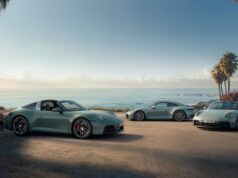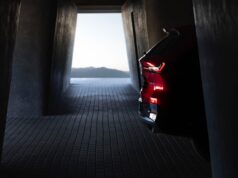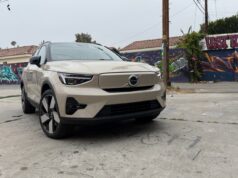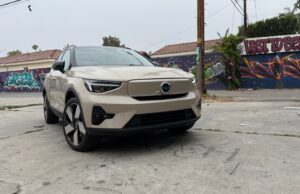
Although the Detroit Auto Show may be over, Ford has decided to unveil new versions of its Ford Escape and Mercury Mariner SUVs for the 2009 model year.
Although the Escape and Mariner were mostly new for the 2008 model year, Ford has seen fit to update the engines and transmissions across the board. Starting with the base 4-cylinder, the engine has been updated to a 2.5L engine up from a 2.3L. Horsepower increases 11 percent to 170 and the mpg increases by 1. The 3.0L V6 gets an extra 30 horsepower and an estimated 1 mpg improvement over the old engine. The new more fuel efficient 2.5L is also the basis for the hybrid model. In addition to the updated engines, Ford has also replaced the archaic 4-speed automatic with a new six-speed which helps improve performance and fuel economy.
The 2009 Ford Escape and Mercury Mariner will be on sale this summer.
Related Stories:
Ford Predicts that the Automaker Will Sell Plug-In Hybrids in 5-10 years
Detroit Auto Show Preview: Ford Unveils EcoBoost Turbo Direct Injection Engines
PRESS RELEASE:
FORD DELIVERS BETTER FUEL ECONOMY, MORE POWER FOR ESCAPE, MERCURY MARINER; EXPANDS E85 FLEET
• 2009 Ford Escape and Mercury Mariner crossovers improve fuel efficiency with new, more powerful I-4 and V-6 engines and 6-speed transmissions.
• Ford’s full-hybrid Escape and Mariner gain performance and refinement improvements for 2009.
• Ford adds three vehicles to its flexible fuel (FFV) line-up for the 2009 model year – Ford Expedition, Lincoln Navigator SUVs and Ford E-Series Econoline vans.
• Ford and Southern California Edison showcase 120-mpg Escape Plug-in Hybrid.
WASHINGTON, D.C., Jan. 22, 2008 – Today at the Washington Auto Show and Automotive News World Congress in Detroit, Ford Motor Company announced its hot-selling compact SUVs, the Ford Escape and Mercury Mariner, will become more fuel efficient, more powerful and more connected for the 2009 model year.
Ford also announced that it is expanding its commitment to biofuels by adding three additional vehicles to its E85-capable flexible fuel line-up for 2009 – the E-Series van, as well as the standard and extended-length models of the Expedition and Lincoln Navigator SUVs. These additional product actions are part of Ford’s sustainability strategy, which also includes high-volume introductions of EcoBoost gas turbocharged direct injection engines.
Speaking today at Automotive News World Congress in Detroit, Ford Motor Company President and CEO Alan Mulally met with industry leaders and media to share today’s announcement and discuss how Ford is accelerating the development of new products and technologies customers want and value. Mulally also reaffirmed that Ford will reach benchmark levels of new or significantly freshened products, delivering a showroom with 70 percent new or freshened vehicles by the end of 2008 and 100 percent by 2010.
“This year, we make good on our commitment to freshen our showrooms,” Mulally said. “We just introduced the new 2009 Ford F-150 last week, and it was a hit. We also have Lincoln MKS and Ford Flex coming, as well as a new Mustang early next year.”
At the Washington Auto Show, Sue Cischke, Ford senior vice president, Sustainability, Environment and Safety Engineering, outlined the company’s high-volume customer-focused strategy to reduce greenhouse gas emissions and improve fuel economy.
“Ford Motor Company is increasing fuel economy and cutting greenhouse gas emissions with affordable technologies for millions of customers,” said Cischke. “In the near term, we will leverage existing technologies to achieve those goals, including advanced engines and multi-speed transmissions. The 2009 Escape and Mariner are great examples of how we’re delivering today.”
Fuel-efficient new 2.5-liter Engine
The new 2009 Ford Escape and Mercury Mariner make strides in fuel economy and emissions with a new, 2.5-liter engine and a smooth new fuel-saving 6-speed automatic transmission.
Not only is the new powertrain expected to improve the Escape and Mariner’s EPA estimated fuel economy by 1 mile per gallon, it will also give the customer an 11 percent increase in horsepower to 170 horsepower.
The new 2.5-liter engine with intake variable cam timing (IVCT) boasts a 17-horsepower increase in output over the outgoing 2.3-liter engine.
Responsive with its peak 166 ft. lb. of torque, the engine also is refined, with dual-mode crankshaft damping, electronic throttle control and PowerPC engine electronic control.
The anticipated 1 mpg improvement in fuel economy will make Escape and Mariner more than competitive in the segment. With the improvements, Escape and Mariner also achieve ULEV II emissions certification.
The new engine also is the new basis for Ford’s hybrid models, ushering in a host of improvements that will make the Ford Escape Hybrid and Mercury Mariner Hybrid even more appealing. Adapted to the Atkinson cycle, the engine is the first for Ford to incorporate variable valve timing on a hybrid engine.
“More than ever, the Escape Hybrid and Mariner Hybrid are the ultimate vehicles for commuters in the daily battle with urban traffic congestion,” said Cischke. “For every eight Escape and Mariner vehicles we sell, one of them is a hybrid, and the appeal is growing.”
An optional, 230-hp, 3.0-liter V-6 engine – a 30-hp increase over last year – also is offered. It, too, will offer an estimated 1 mpg fuel economy improvement and better acceleration, thanks to the new 6-speed transmission and engine enhancements, including new pistons, cylinder heads and fuel injection system.
Spotlight on Fuel Efficiency, Even in the Performance Version
The new, more fuel-efficient automatic 6-speed transmission featured in the Escape and Mariner offers a significant improvement in powertrain smoothness and drivability, replacing the four-speed automatic previously offered.
Its flexibility allows Escape and Mariner to feature a longer final-drive ratio for optimal fuel economy, while its smooth-shifting quality provides an enhanced experience for the driver, especially in combination with the more powerful engines in the Ford Escape and Mercury Mariner family.
Fuel savings also come from additional design and engineering features, including:
• Aerodynamic improvements, including a new front fascia chin spoiler and rear tire spoilers also play a role in the fuel economy story.
• A new 16-inch Michelin tire design offers improved rolling resistance that contributes to fuel efficiency, while also bringing improvements in quiet operation, steering and handling, and stopping distance.
All Escape and Mariner models now feature Easy Fuel™, a capless refueling system. This feature is not only a convenience for customers but also helps to prevent evaporative fuel emissions.
Escape and Mariner also incorporate new features to improve dynamic handling and ride characteristics, including a new 18.5 mm rear stabilizer bar and revised suspension tuning. Powertrain sound quality is enhanced by a new air induction system for V-6 engine models and a new exhaust system on all models.
Ford Hybrids: More Refinement, Safety and Performance
The new 2.5-liter engine also is the new foundation for the Escape Hybrid and Mariner Hybrid models. Adapted for hybrid use, the engine is Ford’s first to use variable valve timing on an Atkinson cycle hybrid engine. Advancements in engine processor technology enable a nearly imperceptible transition from gas to electric mode.
A new brake system also provides a more seamless transition from regenerative braking to traditional braking. It incorporates a new pedal sensor that gives the driver better feedback and pedal feel similar to that of a traditional vacuum-assisted hydraulic system.
Also new this year is a new standard safety feature – AdvanceTrac® with RSC®. Already standard on gas-powered models, this patented Ford Motor Company stability control system includes roll stability control. Escape Hybrid and Mariner Hybrid are the only small hybrids to offer such an advanced safety technology.
At the Washington Auto Show, Ford will display a Ford Escape Plug-in Hybrid (PHEV) alongside the production Escape Hybrid. The plug-in research vehicle uses high voltage, lithium-ion batteries and can travel up to 30 miles on battery power alone before switching to full hybrid mode, delivering the equivalent of up to 120 miles per gallon for far fewer trips to the gas station.
Ford is collaborating with Southern California Edison in a unique partnership to advance the commercialization of PHEVs, demonstrating the potential for two industries to change the transportation and energy future.
This is part of Ford’s sustainability strategy, which also includes a new engine technology called EcoBoost that will deliver up to 20 percent better fuel economy and 15 percent fewer CO2 emissions on half a million Ford, Lincoln and Mercury vehicles annually in North America starting within the next five years.
The EcoBoost family of 4-cylinder and 6-cylinder engines features turbocharging and direct injection technology and will be used in a range of global vehicles – from small cars to large trucks. Compared with more expensive hybrids and diesel engines, EcoBoost builds upon today’s affordable gasoline engine and improves it, providing more customers with a way to improve fuel economy and emissions without compromising driving performance.
More Technology, Connectivity
The popularity of the Ford Escape and Mercury Mariner reflects a trend of continuous improvement and product enhancement, including the most “connected” driving experience available today.
New optional equipment includes:
• SYNC, the award-winning Ford in-car connectivity system developed with Microsoft, will be offered in Escape and Mariner. New for the 2009 model-year, SYNC features “911 Assist” which will help drivers connect with emergency assistance in the event of air bag deployment. Also available for 2009, SYNC will offer Vehicle Health Reports, which are designed to keep owners up to speed with vehicle maintenance needs through the syncmyride.com web site.
• SIRIUS® Travel Link™ , which offers real-time traffic, weather, fuel price, sports schedules and movie information when combined with Ford’s next-generation navigation system with voice recognition.
Growing Popularity
With the continuous improvements to the 2009 Ford Escape and Mercury Mariner, the vehicles are primed to build on their sales success in the 2007 calendar year, which included record hybrid volume. Highlights include:
• Ford Escape Hybrid recorded a 10.4 percent increase in sales versus 2006, with 21,386 units sold, while Mercury Mariner Hybrid sales were up 17 percent over 2006 to 3,722 units.
• Total Ford Escape sales were up 5.2 percent to 165,596. Mercury Mariner was up 2.6 percent to 34,844 units.
The Ford Escape and Mercury Mariner are produced at Ford’s Kansas City Assembly Plant, and the 2009 models will go on sale this summer.













